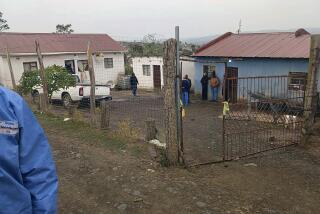7 Die in Grenade Attacks in S. Africa Black Townships
- Share via
JOHANNESBURG, South Africa — Hand grenade attacks in black townships killed seven people, and explosions in the Transkei tribal homeland set a huge fuel depot ablaze, knocked out a power station and cut off the capital’s water supply, police said Wednesday.
Police said seven were injured in the black townships northeast of Johannesburg and that most of the casualties were men whose hands were blown off as they were in the act of throwing grenades into the homes of black policemen.
Police said another explosion in the area, possibly caused by a limpet mine, killed an eighth man who apparently was planting the explosives and damaged an electricity substation.
The explosions in Umtata, capital of the Transkei homeland, appeared to be in keeping with the style of the periodic sabotage attacks staged by guerrillas of the African National Congress. ANC leader Oliver Tambo said Tuesday that the congress has vowed to step up its campaign against white rule but it was not known if the latest attacks reflected a beginning of the escalation.
Dissident Anniversary
The blasts came on the 30th anniversary of the 1955 Congress of the People, in which about 10,000 South African dissidents adopted a human rights declaration known as the Freedom Charter. The one-page document on equal rights in government, justice and education was banned until last year and is seen as the creed of the African National Congress liberation movement.
Mine explosions set off a massive fire at a government fuel depot Wednesday morning, consuming hundreds of thousands of gallons of fuel, Transkei police said. The fire raged for more than six hours before it was controlled. A second explosion minutes later heavily damaged a power station, knocking out electricity in Umtata and its suburbs.
Several hours later, a third blast damaged a water pipeline outside Umtata, cutting of the city’s water supply. Transkei is considered independent by South Africa but is not recognized as such by other nations.
Seen as Apartheid Device
The 10 homelands, where South African blacks have citizenship rights, are regarded by apartheid opponents as a means of denying citizenship to blacks in “white” South Africa.
Grenade attacks in South Africa have increased in recent weeks, mainly aimed at black community councilors and policemen regarded as “collaborators” of the white-minority government.
Security officials have accused the African National Congress of staging the earlier incidents in its fight against the government’s policies of apartheid, institutionalized segregation and discrimination against the nation’s black majority. At least 400 people have died in race-related violence in South Africa this year.
The latest wave of grenade attacks follows a South African raid June 14 on African National Congress targets in Gaborone, capital of neighboring Botswana. Twelve people were killed in the raid, which security officials said yielded “a treasure trove” of intelligence.
Brazil Cardinal Turned Away
In another South African development, authorities prevented one of Latin America’s most prominent Roman Catholic clerics from addressing a Johannesburg anti-conscription rally, U.S. church officials said.
Brazilian Cardinal Paulo Arns of Sao Paulo had been invited by the Southern African Catholic Bishops Conference to address a June 30 peace festival at the Johannesburg cathedral aimed at ending South Africa’s military conscription laws.
Arns was scheduled to share the podium at what South African church officials called the “first ever” peace festival in the cathedral with Archbishop Denis Hurley, president of the Southern African Catholic Bishops Conference.
But according to Arns and church officials, South African authorities in Brazil “at the 11th hour” withdrew the cardinal’s visa after the prelate refused to sign a statement saying he would not participate in the festival.
More to Read
Sign up for Essential California
The most important California stories and recommendations in your inbox every morning.
You may occasionally receive promotional content from the Los Angeles Times.













